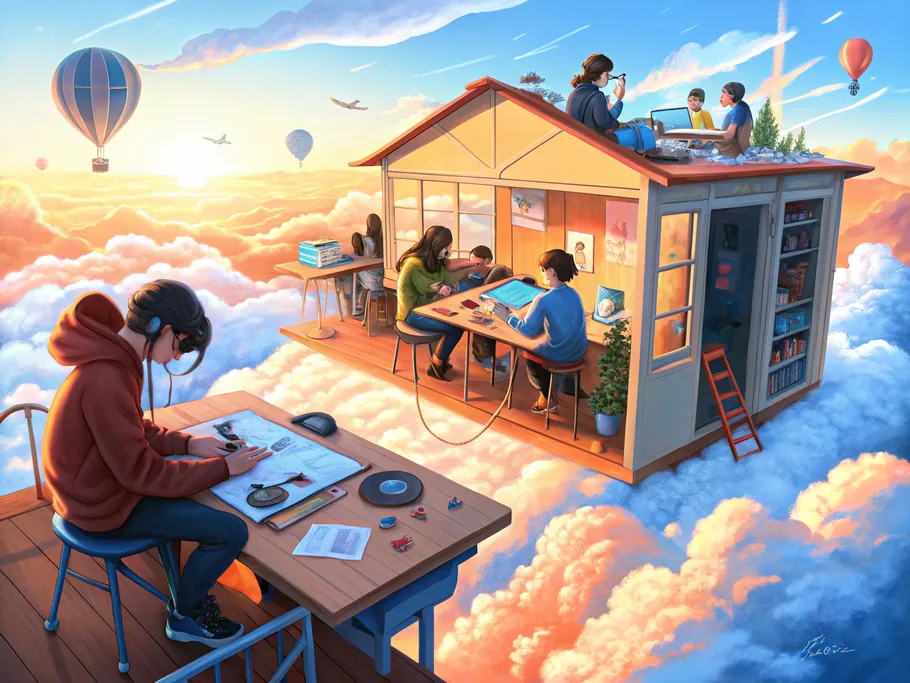Everybody pretty much knows that in humankind, the older generations were teaching the younger ones long before it became formalized as Education. A university education more or less prepares you for the labor market, enabling you to clinch a job based on your specialization.
But, what if you’re not “down” with what your certificate has enabled you to do and want something else?
What if you have ideas you want to pursue but are unsure how to start?
What if you want something outside your 9-5?
What if you want to work on projects that you actually enjoy?
Before you say such a place does not exist, calm down. There’s actually a place, or should I say, there was a place? 😔
Plus, we talked to the founder of this particular place before writing this article.
Oh, and by the way, you can read this article because you’re educated!😆
Buildspace was an innovative online education platform founded by Farza Majeed in 2021. It empowered individuals to build and launch their own projects. The platform gained significant traction with its unique, action-oriented approach to project-based learning, attracting a vibrant community of creators and builders.
Unfortunately, despite its success and backing from prominent investors like a16z and Y Combinator, Buildspace unexpectedly shut down in August 2024.
Farza’s tweet announcing Buildspace closure garnered over 1k replies and retweets
Let’s dig into this promising project that pulled out the rug from beneath the feet of people who wanted a space to work on what they liked and create some “cool shit.”
Status: Closed
Founding Year: Most articles will tell you 2019, but it’s 2021 (more on this in the founding story)
Headquarters: San Francisco, California
Industry: Education and Training Services
B2C, One-sided, Product & Service
Buildspace started as a platform similar to Y Combinator, providing a structured program, mentorship, and a supportive community. However, unlike Y Combinator, which focuses on scalable tech startups, Buildspace targeted individuals with any project idea, regardless of its market potential or revenue goals.
Farza Majeed, a serial entrepreneur passionate about building, founded the company behind Buildspace in 2019. The company was known as ZipHomeSchool but later rebranded as ZipSchool. It was an online platform for live science classes targeting children aged 4-12.

He shut down ZipSchool in August 2021 and pivoted to Buildspace in December 2021. By launching Buildspace, he aimed to disrupt traditional education by creating a space where individuals could learn by doing and bringing their ideas to life.
Farza’s journey includes building and selling products in the gaming industry and training open-source deep-learning models for games. These experiences shaped his vision for Buildspace which stemmed from a desire to create a supportive community where people could pursue their passions and build projects they loved.
He recognized traditional education’s limitations in fostering creativity and practical skills and sought to provide a more engaging and relevant learning experience.
He said, “I started Buildspace because I wanted to build the school that I wish I had.“
Initially, Buildspace focused on a project-based platform where developers built alongside the Buildspace team. This approach proved successful, with some users turning their projects into revenue-generating businesses or using them to enhance their portfolios for job applications.
Despite this success, Farza and his team, which included key personnel like Emily Hough, Alec Dilanchian, Josh Elgar, and David Barrick, pivoted to the “Nights and Weekends” program in 2023. This shift reflected the company’s evolving understanding of its target audience and the changing demands of the EdTech market.
Buildspace leveraged technology to:
Buildspace focused on individuals who are passionate about building projects and launching their own ventures but fall outside the traditional paths of universities and venture-backed startups. This includes:
Buildspace’s “Nights & Weekends” program attracted over 70,000 participants. The broader market of individuals seeking alternative education and project-based learning is substantial and growing, fueled by the increasing demand for practical skills and the rise of the creator economy.
Potential New Markets: if it hadn’t shut down
Growth Trends:
Buildspace faced competition from:
However, it differentiated itself with its unique focus on project-based learning, community-driven approach, and emphasis on building real-world products.
One reviewer noted that Buildspace provided “a more modern, engaging, and relevant education in entrepreneurship and marketing than 99% of what I’ve seen on the internet.“
Main Positioning Values: Quality and Flexibility
Signing up for the Buildspace Nights and Weekends program was free. You have ample time (6 weeks) to work on your idea; of course, quality is emphasized to ensure you produce something meaningful. Lastly and most importantly, the program is flexible to allow participants work at their own pace, the name is already a sellout; You work on your ideas at nights or the weekends 😂
Still want more on Buildspace’s positioning? Go here, Hogwarts for builders and dreamers
Although Buildspace has shut down since last year, its website still pulls in traffic in the thousands according to Ahrefs (1.1k precisely). Before the closure
Buildspace’s Instagram page is a colorful combination of diverse videos
The company actively engaged with its community, sharing updates, promoting projects, and fostering a sense of belonging among its teeming followers. It leveraged its digital presence to attract participants, build brand awareness, and create a thriving online community in the thousands.
Buildspace’s flagship offering was its six-week “Nights and Weekends” program, a free online program designed to help individuals build and launch their own projects. The program provided a structured curriculum, mentorship, and a supportive community to guide participants through the ideation, development, and marketing process. Over 30,000 people participated in this program, with over 3,000 successfully building and shipping their ideas.

Other aspects include:
Unlike traditional education platforms or accelerators, Buildspace’s core innovation focused on empowering individuals to pursue projects they were passionate about, regardless of their market potential.
Buildspace also launched a product called “Sage,” a platform designed to connect builders, makers, and creators with like-minded individuals. This platform fostered collaboration and community building within a broader creative ecosystem.
The brand hosted physical events in San Francisco and Dubai, bringing together its community members for workshops, networking opportunities, and collaborative projects. These events fostered a sense of camaraderie and provided a platform for participants to connect with like-minded individuals and learn from industry experts. Over 1,000 people attended these events.
Buildspace strongly emphasized on building a supportive and collaborative online community, recognizing the importance of peer-to-peer learning and encouragement in the creative process.
Its project-based approach encouraged participants to learn by doing, providing them with practical skills through hands-on project development. They had step-by-step instructions, resources, and community support to help participants build specific projects. Examples of projects included:
Buildspace achieved $1.5 million in annual revenue through its project-based courses before pivoting to the “Nights & Weekends” program.
Buildspace raised a total of $10.1 million in funding over two rounds. The largest round was a $10 million Series A in November 2022, which valued the company at $100 million.
Specific Buildspace’s employee counts are not available publicly
Buildspace appears to have operated with a relatively flat organizational structure, which is common in early-stage startups.
Key personnel included the Founder, Farza Majeed, along with Alec Dilanchian, David Barrick, Emily Hough, and Josh Elgar. However, the lack of clear leadership succession planning proved problematic in the long run.
It’s important to note that the founder’s personal struggles and the company’s closure suggest potential challenges in maintaining a sustainable and scalable company culture.
August 2022: Buildspace gained early traction through viral projects, attracting engineers, startup founders, and indie developers.
November 2022: The platform’s membership surpassed 125,000 participants.
June 2023: Buildspace’s Discord community grew to over 8,600 members, fostering collaboration and progress sharing.
2023: The platform assisted thousands of developers and founders in securing funding, job offers, and startup opportunities.
Early 2024: Buildspace had established a strong network of builders, becoming one of the most influential learning platforms for Web3 and AI.
Mid 2024: The “Nights & Weekends” program expanded significantly, with participation growing from 500 in Season 1 to over 70,000 by Season 5. Notably, over 3,000 participants successfully launched projects, using Buildspace as a launchpad for startups and careers in tech.
Nights and weekends recorded 17,000 ideas in Season 4 with over 1,000 successful ones at the end of the season.
I know you’re wondering why a company that was doing so well ended up shutting down. We were curious too and I reached out to Farza via email asking “Why no one from the team took a seat? Why close the whole company if you can just pass the wheel? Really curious.”
Farza’s response? “passing onwards” a company like Buildspace wasn’t easy, but, was possible. It was more of a community/brand versus a product that someone could come in and continue running.”
Despite its success and strong financial backing, Buildspace announced its closure in August 2024. The founder, Farza Majeed, said the Company was closing not due to investor pressure, monetization struggles, or internal drama but for personal reasons.
In his letter announcing the closure, he stated, “Buildspace has always been driven by passion to do something new and groundbreaking. And sadly, I just haven’t been able to craft an updated direction that feels worth pursuing.“
The shutdown was deeply emotional for fans, but some critics, who saw it as ego-driven rather than strategic, considered it irresponsible.
Key Takeaways from the Announcement & Reactions:
✔ The Love ❤️
⚠ The Shock 😱
Many were blindsided by the sudden shutdown, especially with Season 6 already anticipated. The community expected some continuation or transition, not a full shutdown. Some reactions?
❌ The Criticism 🤬
A small but vocal group criticized the way Buildspace was shut down. Biggest complaints?
Topping the list of critics is Bryan Wade who said, “You didn’t just burn out. You burned the whole thing down because you wanted to ‘discover yourself… Ever think about just hiring a team and letting someone else run it?”
Farza disappeared from social media and took a one-way ticket out of San Francisco without a plan. He traveled to Morocco, the Czech Republic, and Pakistan, looking for peace. He spent his days doing nothing, listening to The Beatles, and meeting “wise people.”

He soon discovered that burnout doesn’t go away overnight, even with travel and reflection. But time, distance, and new experiences can help reboot creativity.
😵 The Struggle
Even in beautiful places, the feelings of burnout and failure followed him. The biggest fear? That he’d never feel excitement about building again. The support from friends and fans was nice, but he still felt like a flop. “Maybe this was really it. Maybe the story ends here.”
💡 The Turning Point
Over time, his passion returned. He realized that the creative spark wasn’t dead—it just needed time to recover. He started feeling like his 13-year-old self again—just excited to build things. “I feel happier than ever. I found that light again.“
Six months later, he’s back—energized and ready to build again. He’s now actively hacking on new ideas and open to collaborating. The SF tech scene welcomed him back enthusiastically. The majority are excited about his return, but some still resent how he handled the shutdown.
🛠 The Love for His Return
Most responses were pure excitement—people are eager to see what he builds next. Many see him as an iconic “hacker” who’s back in the game.
🤬 The Last Remaining Criticism
Critics like Bryan Wade, aren’t so pleased, he pointed to Farza that:
You know, Buildspace’s journey really shows how powerful innovation, community, and passion can be in the EdTech world. Even though its journey ended sooner than expected, its impact is still felt by those who were part of it.
What makes Buildspace’s story so interesting is that it wasn’t a failure in the traditional sense—it had built a strong community and was making an impact. But as it grew, challenges started piling up.
Managing a thriving online community while maintaining a great user experience proved tricky. Since conversations and projects were spread across platforms like Twitter and Discord, things became fragmented, making tracking progress and highlighting standout work harder.
Then there was the big question: monetization. Buildspace explored different options, but each had its trade-offs.
So, what can you do differently as a founder to avoid the Farza situation?
Realize and acknowledge that:
Back to Buildspace: Farza is back, but the Buildspace saga is a case study of how NOT to shut down a thriving community. The Next big question? WHAT WILL HE BUILD NEXT?
His next move will define his legacy—will it be another community-driven project? Or will he avoid that model entirely and focus on something purely product-driven?
We watch and wait.

Email subscription is available ONLY TODAY (oh, okay, and tomorrow).
Surely, we respect your inbox! Unsubscription works every day.

We’d love to tailor your experience — which of these best describes you?